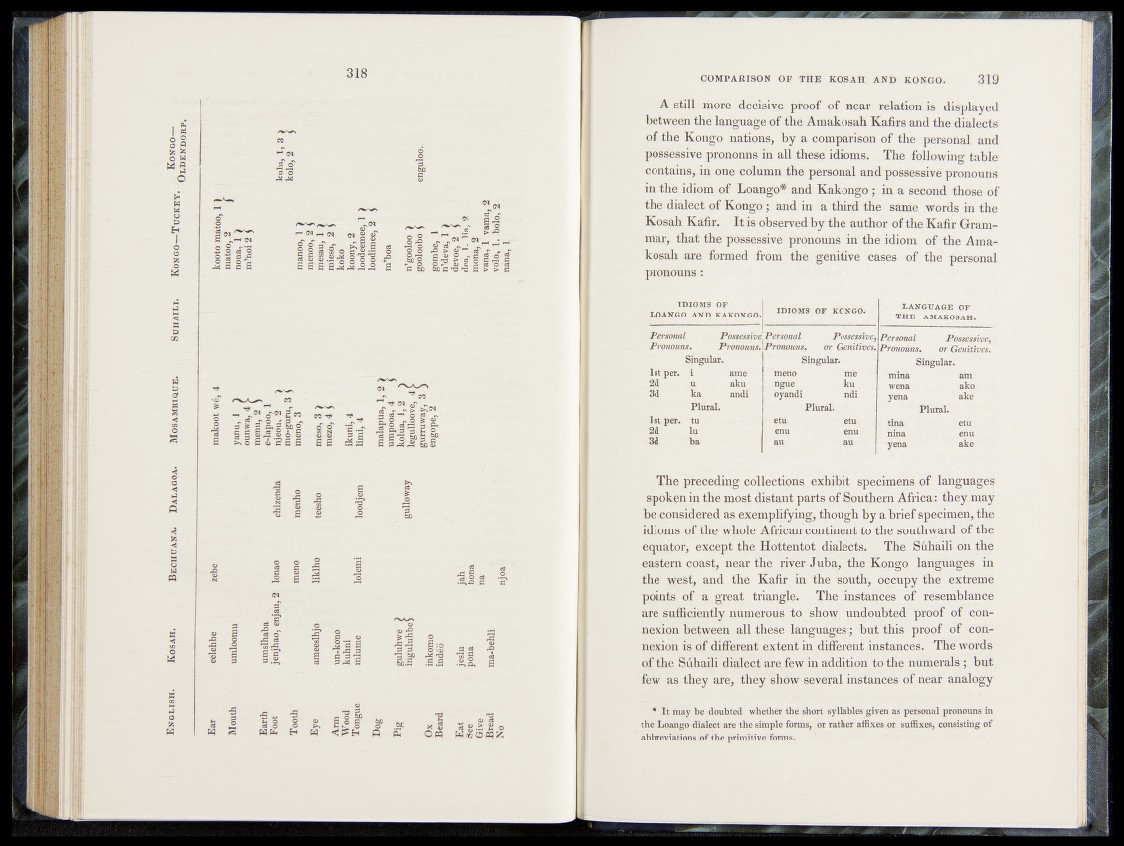
Sm gm
2 O (3'S
g * g „5
<N H <N % Z ^ „(N-I(N . ^ r-OH oO JO Cî>Ö <U«N ^*. *v -* ^ r>'
s I 6D W) S T3 "Ö
I S 1! - •* «•
H V jT
menu, 2
e-lapoo,
njeou, 2
mo-guru,
meno, 3
00 Tfl
O o'
a>
s s
ikuni, 4
limi, 4
malapua,
umpooa,
kolua, 1,.
legullöovi
gurruway
engope, 2
«8CC3
g S*
o rt PcSs o £
<Ö5 m O "~5 5>
o o •g
«5 cs
g 2 ’S J g •*
©
2 * oa
<l>
a£j «o rG o
S rS r3 iot voa> gj - 1 3 1
08 cS 9 s 3 1
g 5o
&.S M H#g3 1 § àS .
ö 'S §) »■g •tj Oo
Eye
S o C
Dog
MM 84»
OW
Eat
See
Give
Erea
No
A still more decisive proof of near relation is displayed
between the language of the Amakosah Kafirs and the dialects
of the Kongo nations, by a comparison of the personal and
possessive prononns in all these idioms. The following table
contains, in one column the personal and possessive pronouns
in the idiom of Loango# and Kakongo; in a second those of
the dialect of Kongo; and in a third the same words in the
Kosah Kafir. It is observed by the author of the Kafir Grammar,
that the possessive pronouns in the idiom of the Amakosah
are formed from the genitive cases of the personal
pronouns:
IDIOMS OF
Ï.0A N 6O AND KAKONGO. IDIOMS OF KONGO- ; DA.NGDAGE ÓF-
TH E AMAKOSAH.
Personal ~ Possessive
Pronouns. Pronouns.
Singular.
1st per. i ame
2d u aku
3d ka andi
Plural.
1st per. tu
2d lu
3d ba
Personal Possessive,
Pronouns. or Genitives.
Singular.
meno me
ngue. ku
oyahdi ndi
Plural.
eta etu
enu enu
au au
Personal . • Possessive^
Pronouns. . 01 Genitives.
Singular.
mina am
wena ako
yena ake
Plural,
tina I
nina ^enu
yena ake
The preceding collections exhibit specimens of languages
spoken in the most distant parts of Southern Africa: they, may
be considered as exemplifying, though by a brief specimen, the
idioms of the whole African continent to the.sputhward or the
equator, except the Hottentot dialects. The Suhaili on the
eastern coast, near the river Juba,\ the Kongo, languages in
the :west, and the Kafir in the south, occupy the' extreme
points of a great triangle. The instances of resemblance
are sufficiently numerous to show undoubted proof of connexion
between all these languages ; but this proof of connexion
is of different extent in different instances. The words
of the Suhaili dialect are few in addition to the' numerals; but
few as they are, they show several instances of near analogy
* It may be doubted whether the short syllables given as personal pronouns in
the Loango dialect are the simple forms, or rather affixes or suffixes, consisting of
abbreviations of the primitive forms.